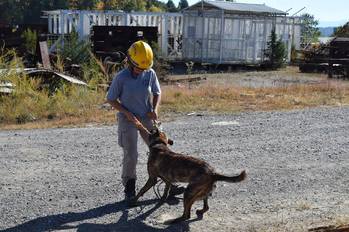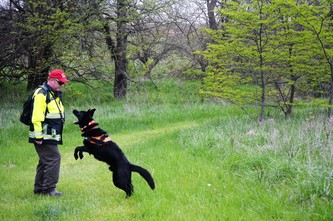
Want to be a Search and Rescue K-9 Handler?
The decision to become a Search and Rescue K-9 Handler is a difficult one and there is no single resource to help you in making this decision. Many people focus on the dog first, but having the right dog is just one consideration of many. As a potential handler, you need to consider your own time and resources to commit to this work and your skills as a handler (ie: land navigation, medical training, K9 training, etc...), in addition to having the right dog for the job. Call-outs come at at any time of day or night, 7 days a week, in all weather conditions. Most of our weekends are spent participating in K9 and/or human training activities, leaving little time for other hobbies. As volunteers, we are financially responsible for all aspects of our equipment, travel, seminars, certification fees, and all aspects of K9 care. This is truly most like a second job that we all pay to participate in, but one that certainly brings great reward.
Learn about K-9 Search and Rescue
If you are interested in learning even more about K-9 Search and Rescue, we highly recommend the on-line independent webinar "Introduction to K9 Search and Rescue" offered by K9 Sensus to get a solid and comprehensive overview of this work. This class covers the different types of search dogs, what is expected of professional canine search and rescue volunteers, what traits and qualities are necessary for a successful canine partner, as well as time and financial considerations. It is an important first step in learning about this work.
K9 Selection Considerations
Selecting the right dog for this work is crucial and essential. It takes a very unique dog with specific traits to do this work. These traits are much more important than a specific breed. Every dog has a “good nose,” but not every dog has the drive to be trained to use that nose for the targeted purpose. Dogs that are suitable for SAR have rock solid nerves (no sensitivity to noises, surfaces, new places, new people, etc..), very high prey and hunt drive, a sociable temperament, and are physically athletic and sound. Most dogs start their training between 7 weeks and 18 months of age. It can take up to two years to properly train a dog (and their handler) to the point of being ready for a certification test. There is also considerable human/handler training that must be completed before a team can attempt a certification (land navigation, first aid/medical for human and K9, ground search skills, lost person behavior, scent theory, search management, hazmat, crime scene preservation, etc...). For more information on selecting a dog for SAR, we recommend reading this article on Selecting the Working Dog.
After reviewing these materials, you are still interested in learning more about K-9 SAR, we welcome guests to attend a training. This is really one of the better ways to get a realistic introduction to what this work involves, the type of dog that is best suited for this work, and if this is something you really want to pursue. To attend a training session, please contact Sergeant Rob Glinka.
The decision to become a Search and Rescue K-9 Handler is a difficult one and there is no single resource to help you in making this decision. Many people focus on the dog first, but having the right dog is just one consideration of many. As a potential handler, you need to consider your own time and resources to commit to this work and your skills as a handler (ie: land navigation, medical training, K9 training, etc...), in addition to having the right dog for the job. Call-outs come at at any time of day or night, 7 days a week, in all weather conditions. Most of our weekends are spent participating in K9 and/or human training activities, leaving little time for other hobbies. As volunteers, we are financially responsible for all aspects of our equipment, travel, seminars, certification fees, and all aspects of K9 care. This is truly most like a second job that we all pay to participate in, but one that certainly brings great reward.
Learn about K-9 Search and Rescue
If you are interested in learning even more about K-9 Search and Rescue, we highly recommend the on-line independent webinar "Introduction to K9 Search and Rescue" offered by K9 Sensus to get a solid and comprehensive overview of this work. This class covers the different types of search dogs, what is expected of professional canine search and rescue volunteers, what traits and qualities are necessary for a successful canine partner, as well as time and financial considerations. It is an important first step in learning about this work.
K9 Selection Considerations
Selecting the right dog for this work is crucial and essential. It takes a very unique dog with specific traits to do this work. These traits are much more important than a specific breed. Every dog has a “good nose,” but not every dog has the drive to be trained to use that nose for the targeted purpose. Dogs that are suitable for SAR have rock solid nerves (no sensitivity to noises, surfaces, new places, new people, etc..), very high prey and hunt drive, a sociable temperament, and are physically athletic and sound. Most dogs start their training between 7 weeks and 18 months of age. It can take up to two years to properly train a dog (and their handler) to the point of being ready for a certification test. There is also considerable human/handler training that must be completed before a team can attempt a certification (land navigation, first aid/medical for human and K9, ground search skills, lost person behavior, scent theory, search management, hazmat, crime scene preservation, etc...). For more information on selecting a dog for SAR, we recommend reading this article on Selecting the Working Dog.
After reviewing these materials, you are still interested in learning more about K-9 SAR, we welcome guests to attend a training. This is really one of the better ways to get a realistic introduction to what this work involves, the type of dog that is best suited for this work, and if this is something you really want to pursue. To attend a training session, please contact Sergeant Rob Glinka.
